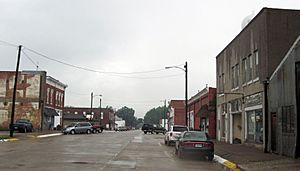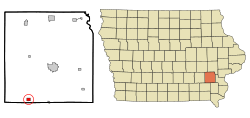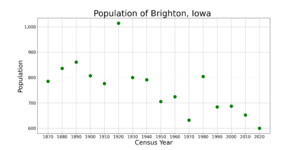Brighton, Iowa facts for kids
Quick facts for kids
Brighton, Iowa
|
|
|---|---|
 |
|
| Motto(s):
Home of Lake Darling State Park
|
|

Location of Brighton, Iowa
|
|
| Country | |
| State | |
| County | Washington |
| Area | |
| • Total | 0.78 sq mi (2.03 km2) |
| • Land | 0.78 sq mi (2.03 km2) |
| • Water | 0.00 sq mi (0.00 km2) |
| Elevation | 751 ft (229 m) |
| Population
(2020)
|
|
| • Total | 600 |
| • Density | 767.26/sq mi (296.15/km2) |
| Time zone | UTC-6 (Central (CST)) |
| • Summer (DST) | UTC-5 (CDT) |
| ZIP code |
52540
|
| Area code(s) | 319 |
| FIPS code | 19-08470 |
| GNIS feature ID | 2393419 |
Brighton is a small city in Washington County, Iowa, in the United States. It's part of the larger Iowa City area. In 2020, about 600 people lived there. Brighton is known as the "Home of Lake Darling State Park," which is a popular spot for outdoor fun.
Contents
History of Brighton
Brighton was first planned out in 1840. In its early years, during the 1840s and 1850s, it quickly became a major center for raising hogs (pigs) west of the Mississippi River.
Cool Discoveries and Challenges
In 1851, a man named David Powers found something amazing: the fossil remains of a Mastodon. A mastodon was a huge, elephant-like animal that lived a long time ago. The fossil he found was three and a half feet long and weighed 83 pounds! However, in 1854, Brighton faced a tough time when many people got sick during a cholera outbreak.
The Brighton Railroad War
In 1882, two different railroad companies, the Iowa Central Railway and the Burlington and Western Railway, wanted to build their tracks through Brighton. They both wanted the same space! This led to what people called the "Brighton Railroad War."
Workers from each company would sometimes tear up the tracks the other company had just laid down. There were even arrests and court battles! Eventually, both companies built their tracks side-by-side down a street that was originally planned for the town. This was a very unusual way to build railroads. Both lines also crossed another railroad, the Chicago, Rock Island and Pacific Railroad, on the east side of town.
Later, the Burlington and Western line was made wider and taken over by the Chicago, Burlington and Quincy Railroad. The Iowa Central line was taken over by the Minneapolis and St. Louis Railway.
Train Stations in Town
Brighton used to have three different railroad depots (train stations).
- The Burlington and Western depot was on the east side of town.
- The Iowa Central depot was on the west side.
- The Rock Island depot was a few blocks south.
Each railroad also had special areas called stockyards where they kept animals like cattle before shipping them.
Geography of Brighton
Brighton is located in Iowa, where two state roads, Iowa State Road 78 and Iowa State Road 1, meet. It's also close to the Skunk River. The city covers about 0.71 square miles (2.03 square kilometers) of land.
One of the most important natural spots near Brighton is Lake Darling State Park. This park is a great place for outdoor activities and is a big draw for visitors.
Population of Brighton
| Historical populations | ||
|---|---|---|
| Year | Pop. | ±% |
| 1870 | 785 | — |
| 1880 | 836 | +6.5% |
| 1890 | 861 | +3.0% |
| 1900 | 807 | −6.3% |
| 1910 | 776 | −3.8% |
| 1920 | 1,014 | +30.7% |
| 1930 | 800 | −21.1% |
| 1940 | 791 | −1.1% |
| 1950 | 705 | −10.9% |
| 1960 | 724 | +2.7% |
| 1970 | 632 | −12.7% |
| 1980 | 804 | +27.2% |
| 1990 | 684 | −14.9% |
| 2000 | 687 | +0.4% |
| 2010 | 652 | −5.1% |
| 2020 | 600 | −8.0% |
| Source: and Iowa Data Center Source: |
||
Brighton is a small city, and its population has changed over the years. In 2020, there were 600 people living in Brighton. The city had 257 households, which are groups of people living together.
Most people in Brighton are White. About 27% of the people living in Brighton are under 20 years old. The average age in the city is about 39.4 years old. There are slightly more males than females living in Brighton.
Education in Brighton
Students in Brighton attend schools that are part of the Washington Community School District. This district includes Washington High School, where older students go.
Famous People from Brighton
Some notable people who have lived in Brighton include:
- Francis W. Cushman: He was a U.S. Representative from the state of Washington.
- William Ward Johnson: He was also a U.S. Representative, but from California.
- Mila Tupper Maynard: A Unitarian minister.
- Ellen Smith Tupper: An American apiarist (someone who keeps bees) and the first woman to edit a journal about insects.
Images for kids
See also
 In Spanish: Brighton (Iowa) para niños
In Spanish: Brighton (Iowa) para niños
 | Dorothy Vaughan |
 | Charles Henry Turner |
 | Hildrus Poindexter |
 | Henry Cecil McBay |



